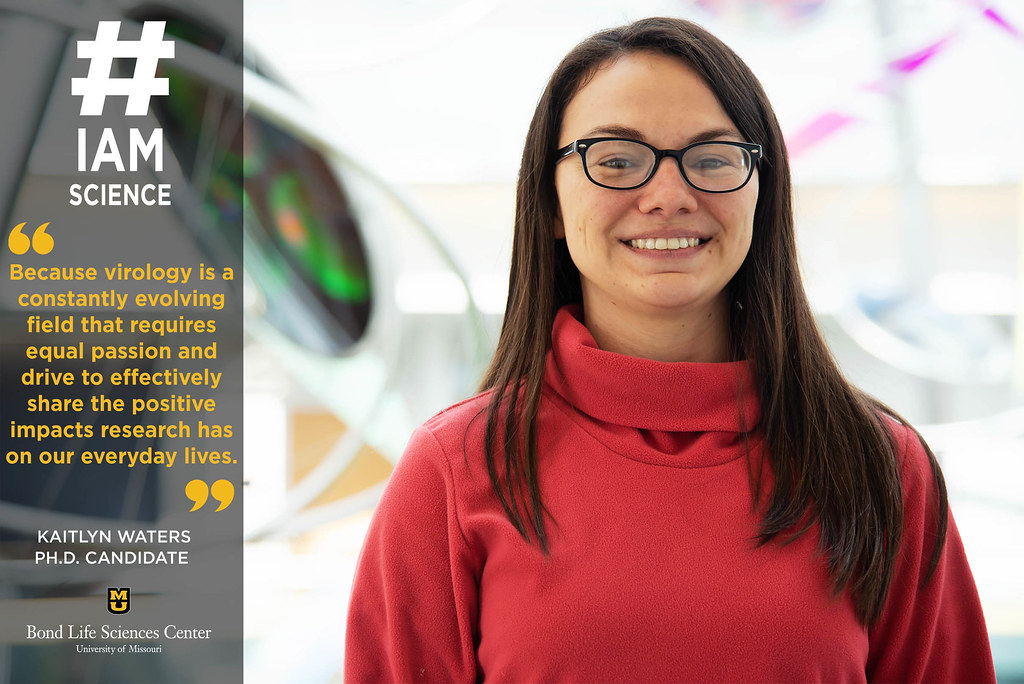Published on
By Mariah Cox | Bond LSC
It’s common knowledge that all Ph.D. candidates must complete
research in preparation for a dissertation, but what happens when one’s faculty
mentor moves to a different school before completion?
Kaitlyn Waters found herself in that situation as she was
preparing for the final year of her Ph.D. program.
Waters, a current veterinary medical sciences Ph.D. candidate at
Mississippi State University (MSU), is finishing her research in the Bond Life
Sciences Center with primary investigator Henry Wan. Wan came to Mizzou last
summer from MSU as a joint professor in the School of Medicine, the departments
of Veterinary Pathobiology, and Electrical Engineering and Computer Science.
While a handful of Wan’s Ph.D. candidates graduated before he left
MSU, Kaitlyn Waters and Mandy Guan were the last of the bunch to finish their
degrees.
For Waters, it was a simple decision moving 500 miles from
Starkville, Mississippi, to Columbia.
“It was actually pretty easy. Like personally and especially just
school-wise and finishing the research,” Waters said. “The way he presented it was
that we had more opportunities here to collaborate with more departments around
campus and core facilities. It was definitely an easy decision.”
After graduation, Waters has a four-year fellowship with the
Foreign Animal Disease Diagnostic Laboratory (FADDL) that begins at Plum Island
in Connecticut and transitions to the National Bio and Agro-Defense Facility
set to open in Manhattan, Kansas, in 2022.
“They’re opening up this new facility and they’re bringing in new
scientists. They’re training us to be the, quote, unquote, ‘next group of
scientists’ for that facility,” Waters said. “It’s a lot of responsibility, but
it’s exciting.”
Before her move to Missouri, Waters had never lived far away from
home. A Byram native, Waters only moved two-and-a-half hours away to attend MSU
for her undergraduate and doctoral degrees.
“If I had done this right after finishing undergrad, I think it
would have been difficult but because I’m older now, I am more comfortable
being independent and relying on myself.”
While it was an important steppingstone for Waters’
post-graduation plans, she misses the football culture and food back home.
“I’m a big sports fan in general and I’ve noticed that Columbia
still functions during football games, which is completely weird to me because
Starkville shuts down. You can’t go anywhere near MSU’s campus on gameday
without traffic being insane and people being everywhere,” Waters said.
Before Waters began the research path, she wanted to become a
veterinarian, but those plans got derailed when she found out she did not get
into veterinary school.
“When I didn’t get in it was kind of like, I have no backup plan,”
Waters said. “Before joining Dr. Wan’s lab I had never held a pipette. I had
heard about research, but I had no idea that it’s really what I wanted to do. I
definitely don’t think I would be the person I am today if I had gone to
veterinary school.”
From not being able to hold a pipette, Waters has come a long way
since the beginning of her doctoral program. Waters’ dissertation focuses on
the RNP complex, which are three polymerase proteins in the influenza genome
that are responsible for the replication of viral genome and RNA. Specifically,
she is looking to understand how the RNP complex efficiently and inefficiently
replicate in nature to cause new viral strains.
According to Waters, her research path has given her a chance to
learn and grow not only as a scientist, but also as a person that she might not
have gotten back home as a veterinarian.
“If I had gotten into vet school and become a veterinarian, I
would’ve stayed in Mississippi to practice as a clinician and, possibly, own my
own clinic which would’ve been great. But now knowing I will have a Ph.D. in
infectious diseases, I also know this path can take me anywhere in the word and
I can see a lot more whereas if I’d been a veterinarian I would not be
experiencing the things that I get the chance to experience now.”
At Plum Island, Waters will serve as a liaison between the
computer scientists and the biologists and virologists. Her fellowship will
allow her to collaborate with influential scientists and travel the world.
After the four years is up, Waters hopes to stay with the National
Bio and Agro-Defense Facility.
“I don’t think I can get a better research experience anywhere
else in the United States. At this moment, I plan on sticking with it and
staying with them, but anything could happen.”
